They fled war and famine, but the next challenge for these Boy Scouts is camping in Colorado
share

LITTLETON, Colo. — Born in Syria, 17-year-old Mahmoud Hajdaen went from living in open farmlands to urban spaces near Aurora when his family arrived in Colorado as refugees.
Not only was the landscape new, but so were the people, culture and language.
Hajdaen’s family moved to Colorado in 2014 to escape war in Syria. Through services his family received from Mango House — an East Colfax organization that provides business opportunities, medical services and community for refugees, asylees and undocumented families — Hajdaen learned of Boy Scout Troop 1532, which Dr. P.J. Parmar of Mango House formed for young refugees to help transition to life in the U.S.
Through the boy scout troop, campers like Hajdaen, who joined the troop in fifth grade, find solidarity, support and the comforts of home during a formative time in their lives.
“[My friends] always tell me, ‘you came from camping in Syria in the worst way. Why would you go back to it?” said Hajdaen of joining the troop.
The answer for Hajdaen, who will be entering his senior year of high school in the fall, is the combination of nature’s healing and the power of feeling seen.
Hajdaen said that while he has many friends, not many are as intrigued by nature as he is. He said it’s also hard to find friends that understand his background.
“I’ve never really had that strong of a friendship,” he said. “But here [at troop 1532], I have friends here who came maybe two or three months ago. Now we're like brothers because of the common experiences that we share.”
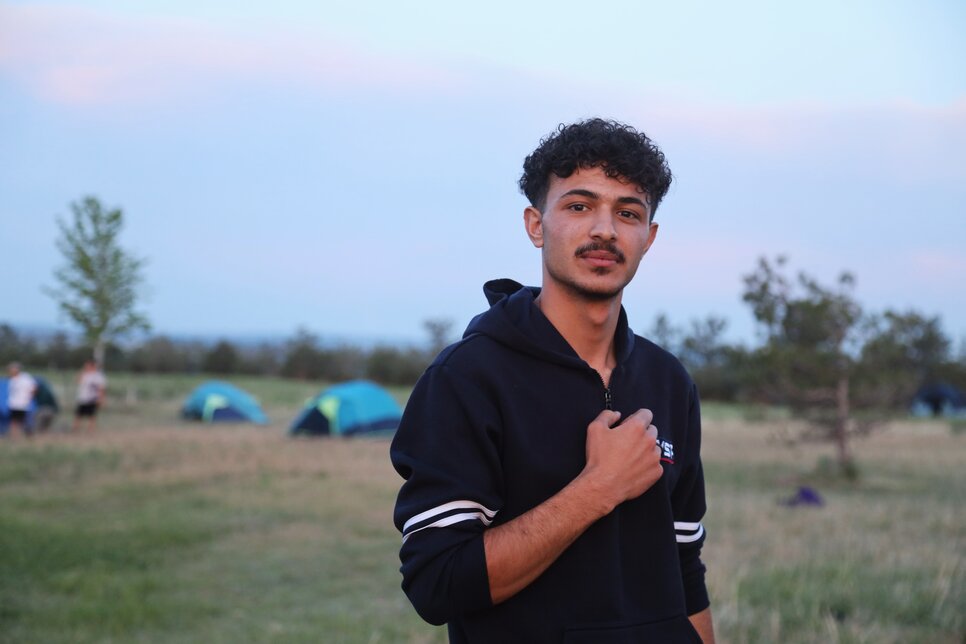
Hajdaen appreciates the opportunity to enjoy nature every chance he gets.
Photo: Elle Naef, Rocky Mountain PBS
This summer, Troop 1532 celebrated its 10th anniversary with a camping trip at Chatfield Reservoir.
Parmar, the troop leader, physician and owner of Mango House, spent much of his youth in the Boy Scouts. There, he found a level of acceptance he too had a hard time finding in school.
Parmar started the troop to give the kids he works with the same opportunities he received.
“Many of these parents don’t have the ability to speak English, or they don’t have much time or money,” said Parmar, who joined the Boy Scouts shortly after his family moved to Chicago from India via Canada.
“This gives the kids the opportunity to get out, do something different, and experience society in a way that they maybe wouldn’t be able to [otherwise].”Troop attendance varies greatly. Parmar said he has no idea how many will show up until the vans are loaded and they’re on their way. This time, around 25 campers showed up.
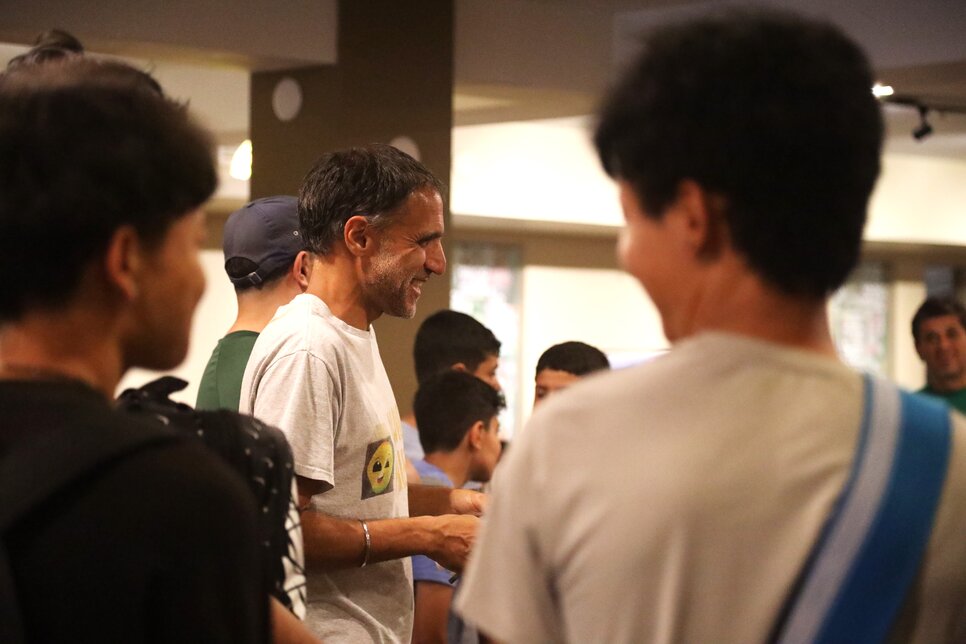
Dr. P.J Parmar greets Boy Scout Troop 1532 members at Mango House
Photo: Elle Naef, Rocky Mountain PBS
In accordance with changes in the national Boy Scouts from 2013-2017, Troop 1532 has grown to accept girls and LGBTQ+ youth.
Parmar works to ensure it is also culturally and financially inclusive. Mango House provides all gear, transportation and food.
In addition to limited resources, Parmar said, many families like Hajdaen’s have limited space.
“I'm the oldest of six, and it gets to be a lot on my mind sometimes,” said Hajdaen,
“So this trip had always come at the right moment for me, whenever I'm not feeling good at the house and I want a break, I just come out here, and two days later [it’s] like nothing happened.”
Before their adventures, campers meet at Mango House — a place familiar to most of them. The lobby was abuzz with campers ages 8 to18 years old playing ping pong, chatting with friends and catching up with Parmar and three volunteer troop leaders.
After check-in and a stop at the gas station for snacks, the troop arrived at Chatfield Reservoir with just enough daylight left to set up camp. They broke into teams and got to work building their tents.
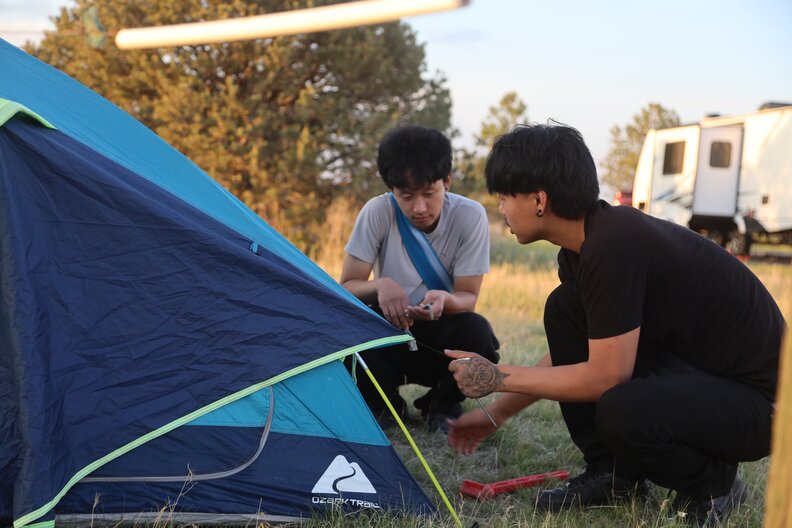
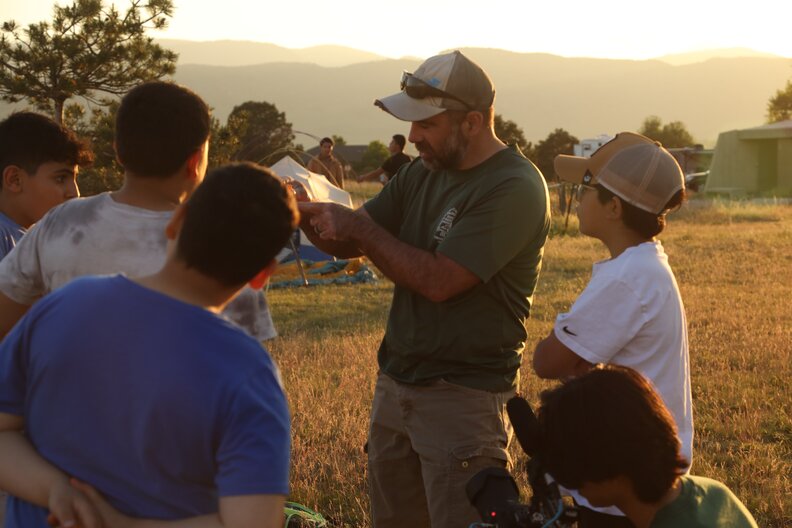
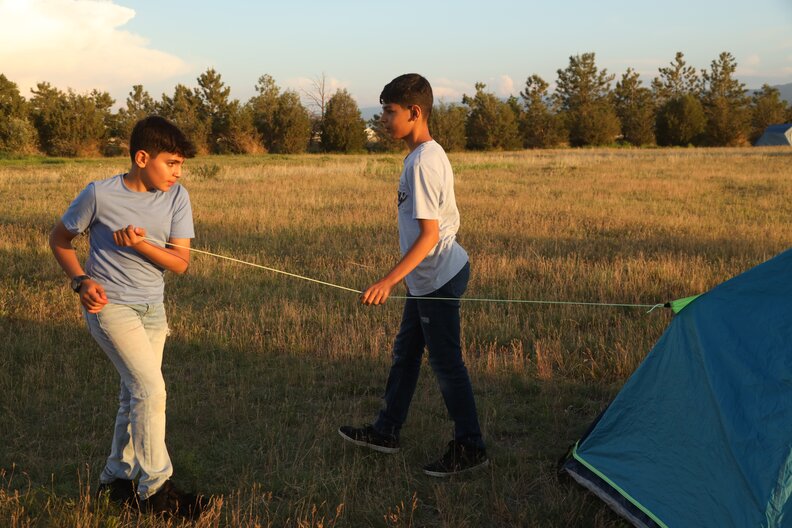
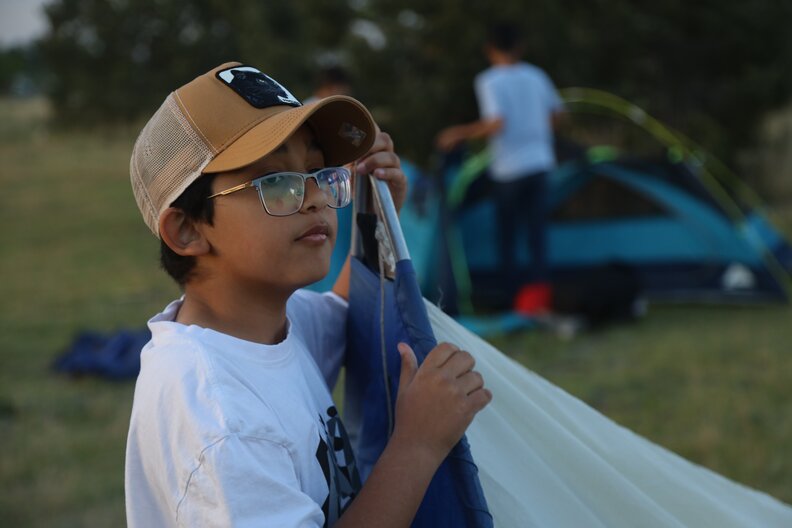
Campers broke off into small groups for their first challenge of the evening at the troop’s tenth anniversary trip at Chatfield Reservoir: tent building.
Photos: Elle Naef, Rocky Mountain PBS
Hajdaen’s group included his cousin and newcomer Ahamad, a high schooler whose family arrived from Gaza seven months prior, shortly after the Israel-Hamas war broke out on October 7, 2023.
The ongoing bombardment in Gaza has resulted in more than 38,000 Gazans dead, with roughly 120 Israeli hostages remaining Hamas captives in the territory, the Associated Press reported.
“Children are being killed, buildings collapse while they're still in them, and they are starving to death,” Ahmad said of his experience in Gaza before fleeing to the U.S. “This keeps happening to them even though they had nothing to do with the events.”
While Ahamad’s immediate family was able to make it to the U.S safely, he said he also considers everyone left behind as family, and feels their suffering.
“They are my people. I have the courage to say that,” he said.
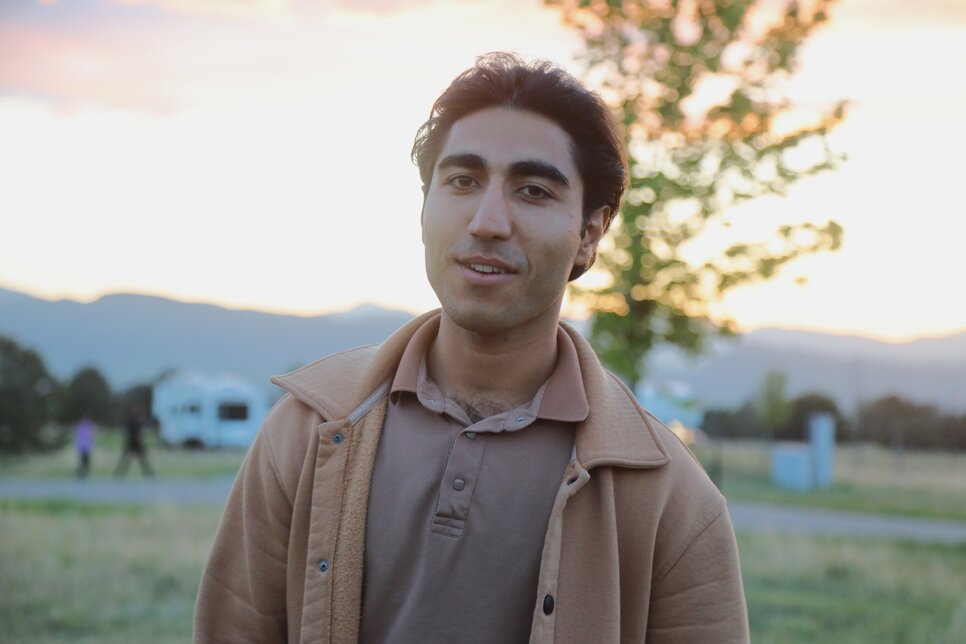
Ahamad, a recently arrived refugee from Gaza, said he felt joy being around friends.
Photo: Elle Naef, Rocky Mountain PBS
Both Hajdaen and Ahamad said that having a place where you can speak your own language — they are both Arabic speakers — and meet others who have been through similar experiences is essential for processing the intense challenges that come from being refugees.
“We understand him because we are also going through the same thing. We're all brothers. His family is my family,” said Hajdaen.
After setting up tents at Chatfield, the campers gathered around picnic tables to prepare dinner. Parmar said that when it comes to food for the trips, balance is key.
“You can't keep a teenager happy if you don't feed them stuff they like. But you also can't just feed him Hot Cheetos and Takis all day, which is what I started doing and realized it is not a good idea,” he said with a smirk.
Parmar does a majority of the shopping and planning on his own. Oftentimes, he’s able to shop inside Mango House or at places in the East Colfax neighborhood.
Some campers requested foods from their country of origin, such as Nepalese chipati, a puffed rice. But, Parmar said, culture isn’t only based on geography.
“Culture doesn't have to just mean from a different location on this planet. It can mean the culture of poverty,” he said.
Parmar explained that for this reason, he also stocks up on things like powdered milk versus regular milk, not necessarily because it relates to the scouts’ countries of origin, but because it provides a different sense of familiarity to the campers, who are used to lower-cost food.
Troop leaders stood by, ready to support if needed, but making sure to let campers take the lead. Meals are an important part of the campers learning accountability, specifically for the boys.
“For the males who come, their homes are mostly very female-run households who are doing the cooking, cleaning and taking care of all the chores,” said Parmar. “And so I tell them, ‘your moms aren't here to cook for you, nor are your sisters. So you've got to cook it, you've got to clean it.’”
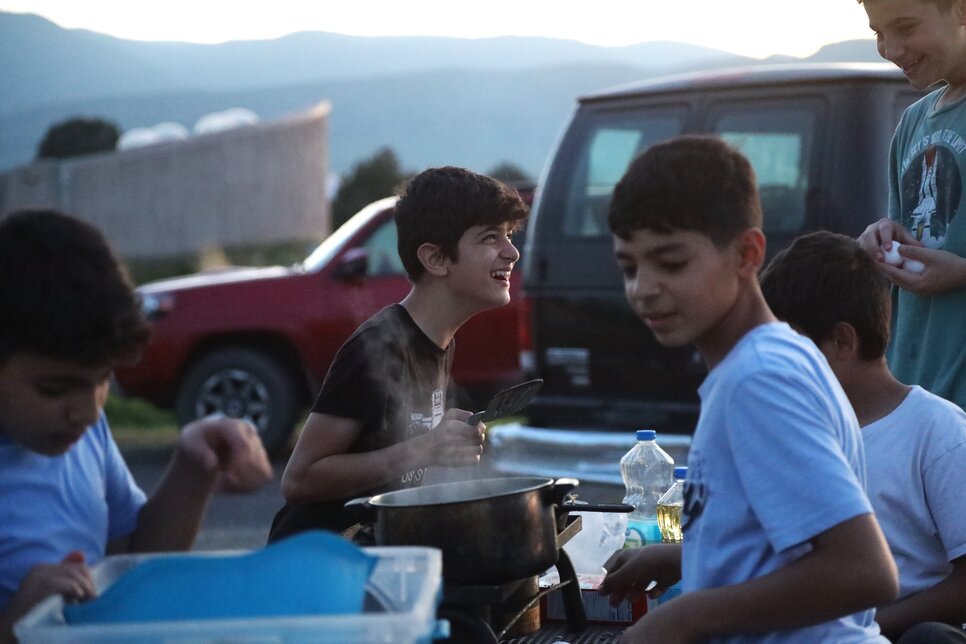
Campers gather around a picnic table to prepare dinner.
Photo: Elle Naef, Rocky Mountain PBS
After a shared meal and a campfire, the campers and troop leaders settled in for the night, getting what rest they could before a day at the beach, Colorado style.
“The thing that keeps me going is just watching the kids, especially the younger ones, get so excited at some very simple pleasures, like just jumping in the lake,” Parmar said.
Hajdaen said being outdoors will always inspire him. “It’s amazing that I can come here and see how green everything is. I love the mountains. I like the clouds, the sunset.”
When it comes to the future of the troop, Parmar said he has no expectations or hopes beyond continuing to provide the outings for as long as there is interest.
As for Hajdaen and Ahamad? Hajdaen hopes to become a pilot on a full-ride scholarship.
“Traveling had always been part of my journey, so I want to keep going,” he said. “I can maybe even visit my home country some day.”
Ahamad is also focused on home.
“My hope is that the children [of Palestine] don't get killed,” he said “I hope the whole country lives in peace.”
